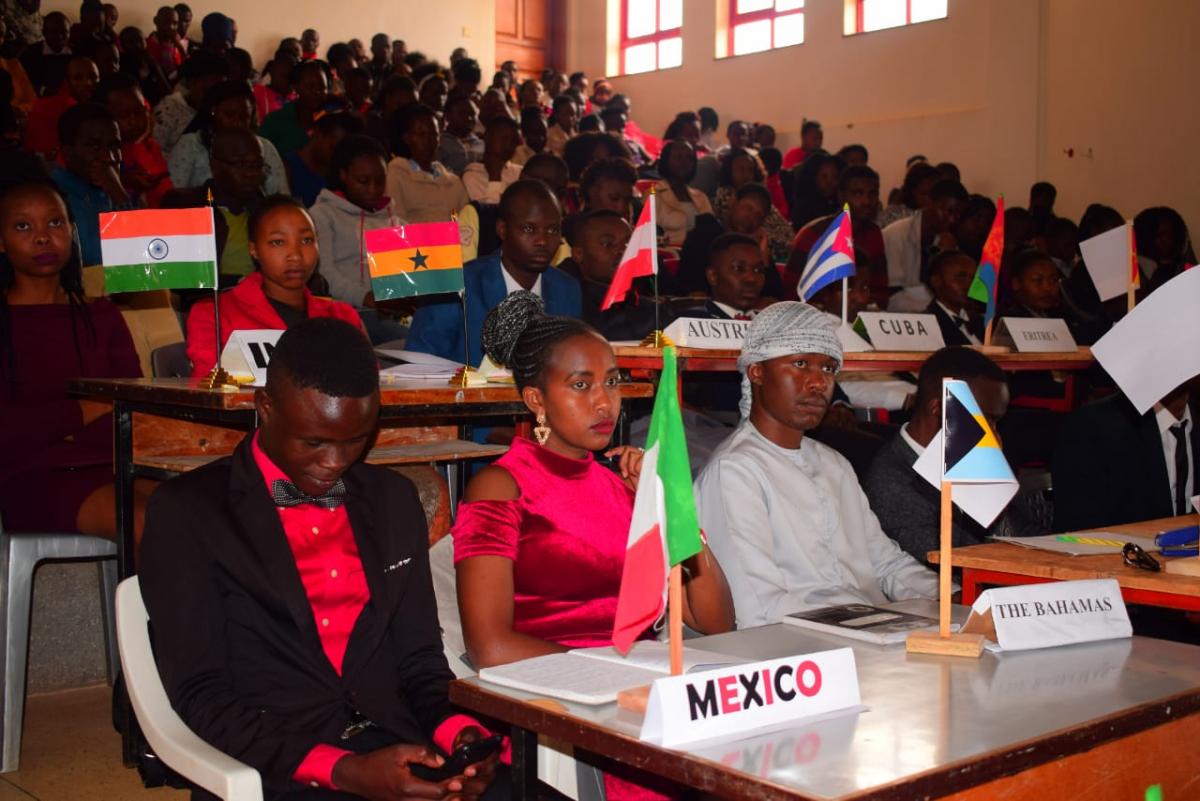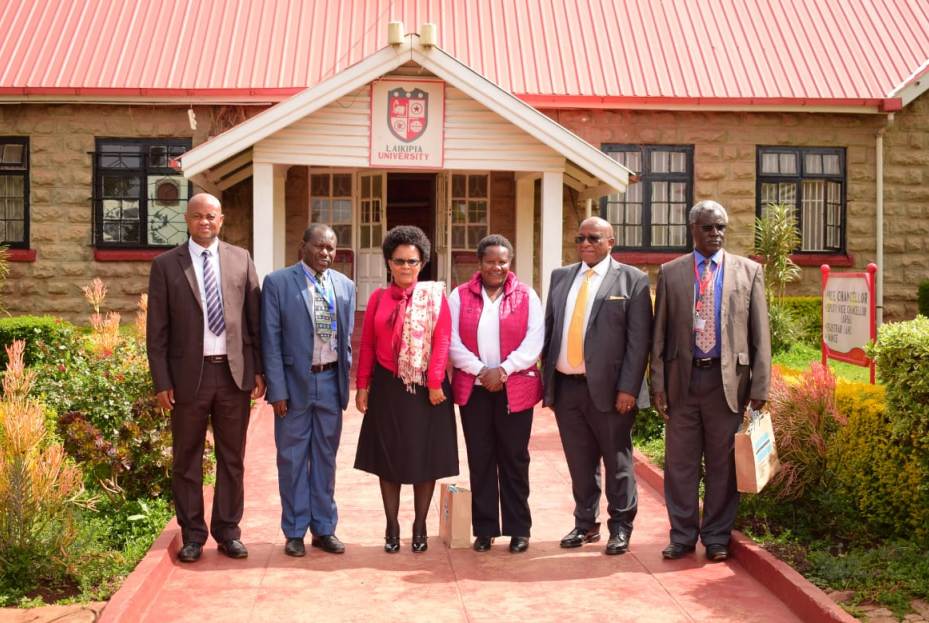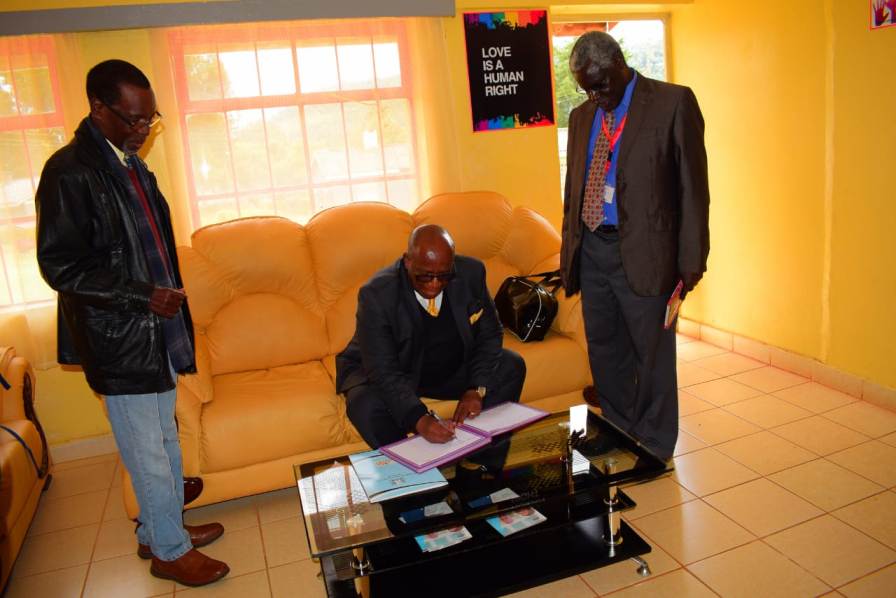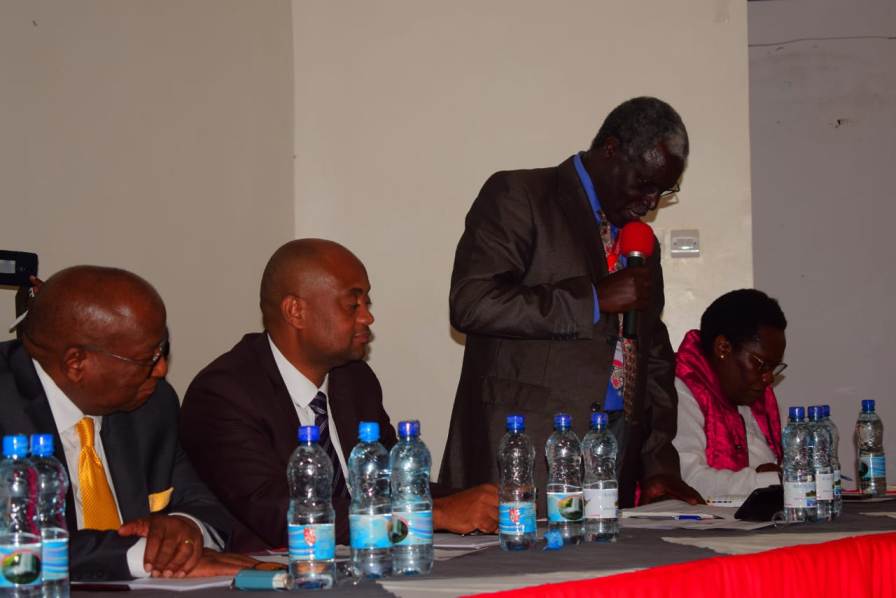Laikipia University was proud to host a Mini-model United Nations Assembly on March 4 2020 which was addressed by His Excellency Mr. Gobopang Duke Lefhoko, High Commissioner of the Republic of Botswana to Kenya. The Model staged by unit COM 471: Introduction to Diplomacy class, Model United Nations has always involved researching and debating important global issues, Communication and Media Department and Directorate of External Linkages of Laikipia University would like to see it become an actual agent of change in communities across the globe. This arrangement provides a platform for negotiations and debate gives the young people an insight into the world’s problems and enables them to understand the causes of conflict between nations. Laikipia University thus contributes in fulfilling the global aims and goals set forth in the Preamble to the Charter of the United Nations — namely to practice tolerance and live together in peace with one another as good neighbors. The Model United Nations also offers students an excellent opportunity to expand, develop and put into practice their language skills.
In 2018 H.E Mr. Lefhoko was appointed Botswana’s High Commissioner to Kenya. He was also appointed the Permanent Representative to the United Nations Environment Programme and the United Nations Habitat in the same year. He served as a Member of Parliament for Shosong Constituency from 2004-2009. He was also an Assistant Minister in the Ministry of Education and appointed in the same capacity to the Ministry of Trade and Industry. Mr. Lefhoko has also served in the diplomatic service as Botswana’s High Commissioner to the Republic of Namibia from 2010 to 2013. He replaced Mr. John Moreti. Moreti visited Laikipia University twice. Mr. Lefhoko is a teacher by profession.
H.E Mr. Lefhoko paid a courtesy call to the Vice Chancellor, Prof. Kibett Rotich. In attendance were the Deputy Vice-Chancellor Academic Research & Student Affairs (ARSA), Prof. Wanjiku Chiuri, the Dean of School of HDS, Prof. Khasandi, Dr. Chacha, Dr. Kirigia and Prof. Gutto. During the meeting, the Vice Chancellor, Prof. Rotich noted that the University is working to see how she can expand by offering more programmes. He noted that there has been a lot of communication between the Republic of Botswana High Commission to Kenya and the University and that there is a strong working relationship with the Republic of Botswana. H.E Mr. Lefhoko said it was a privilege to be invited over to Laikipia University. He noted that Botswana is a great beneficiary of Kenyan education. H.E Mr. Lefhoko is the third High Commissioner of the Republic of Botswana to Kenya to visit the University. Mr.Lefhoko visited the Centre for Human Rights where he planted trees.
H.E Mr. Lefhoko’s Public Lecture on ‘Botswana Foreign Policy and Diplomacy’ focused on the following areas:
- Botswana at a Glance;
- The pillars (tenets) that inform Botswana’s foreign policy posture and how these have withstood the test of time:
Democracy:
- Democracy at home translated into a foreign policy pursuing democracy abroad through, inter alia;
- Establishment of diplomatic relations with democratic countries;
- Advocacy for democratic ideals and governance abroad (democratic world);
- Peaceful resolution of conflict as a modus operandi globally;
- Strong advocacy for self-determination of peoples and decolonisation;
- Providing refuge for victims of racial domination and segregation from neighbouring racist and white minority ruled regimes; and;
National Unity:
- A critical element of nation building and national virtue at home.
- In all post-colonial societies, national unity inspired a foreign policy calling for utilitarian unity or solidarity, especially among countries of the South, to defend and promote common interests in the international system.
- International solidarity initiatives include: Membership to Frontline States (FS), Southern African Development Coordination Conference, SADCC (now Southern African Development Community, SADC), Organisation of African Unity, OAU (now the African Union, AU), the Commonwealth and the United Nations;
Development:
- The development imperative at home (to provide/ improve infrastructure, jobs, healthcare, skills, food security e.t.c) led to a foreign policy call for, inter alia:
- Official Development Assistance (ODA) flows from the North to the South; Foreign Direct Investment (FDI) flows from the developed to the developing world (to boost industrialisation and diversification);
- Protection of infant industry; A New International Economic Order (NIEO) generally including fair trade;
Self-Reliance (Ipelegeng):
- A national operational philosophy at home to help reduce dependency syndrome (on government support) and encourage collective / community effort as a virtue, self-reliance inspired in Botswana’s foreign policy:
- Advocacy and positive disposition for South / South co-operation generally (Botswana was instrumental in the creation of the Southern Africa Development Community).
- What did Botswana want from the international system (that is, the country’s foreign policy goals):
- First, what Botswana wanted in the international system was based on what the policy makers saw as key national interests, namely, national security (protection of territorial integrity and national sovereignty) and economic development. These key imperatives were pursued in the context of equally important national values of democracy, national unity and self-reliance, as well as internationally accepted principles of peaceful co-existence, peaceful resolution of conflicts and non-interference in the internal affairs of states;
- The chief focus of foreign policy was therefore the concrete goals of physical and economic security, as well as non-quantifiable attributes, in the form of national values which defined the country in the eyes of the world. These were practical goals, limited to the primary needs of the country at the time, but still relevant for any assessment of the country’s performance in the foreign policy space today.
- These factors may not have totally derailed Botswana’s foreign policy train, but they surely tempered with some of her cargo. For example, the country maintained technical level contacts with racist South Africa through SACU (Southern African Customs Union), but had no formal diplomatic relations with the apartheid regime;
- Botswana’s foreign policy achievements should thus be assessed in the context of this unconducive domestic and external environment, elements of which still encumber Botswana’s foreign policy choices today;
- What was the context (both domestic and external), under which Botswana pursued these goals
- Botswana conducts multilateral diplomacy in the context of international organisations like the UN, AU, the Commonwealth as well as regional mechanisms such as SADC (which Botswana played a critical role in establishing), to promote national interest abroad;
- The UN, the largest of these, confers universal legitimacy across the widest possible spectrum of collective human undertakings.
- The new state system paved the way for liberal institutionalism (cooperation through international institutions using multilateral diplomacy as a modus operandi) as one of the global governance mechanisms of the liberal international order, aimed at enhancing dialogue, cooperation and peace among states;
- Pursuit of common endeavours (common security, economic integration e t c), has become even more imperative as a result of increased economic interdependence and globalisation generally. Multilateralism allows in principle, every nation, irrespective of size or resources, the legitimate right to be heard, and an expectation to have its plight addressed, if not resolved;
- Botswana has had recourse to the UN and other multilateral bodies—not as a substitute for bilateral or regional approaches, which she continues to maintain with her allies, but as the most appropriate tool for a specific purpose under given circumstances - to advance her foreign policy goals;
- This stance however also made the country a target for various forms of retribution by the neighbouring minority regimes, including threats to her national sovereignty. But the endorsement and support of Botswana’s political position by these established international bodies, served as a moral deterrence against threats to her sovereignty, as well as a source of international legitimacy for - and moral vindication of - her political values, beliefs and indeed actions in support of human freedom beyond her borders;
- Third, international institutions extended to the then poor nation much-needed resources to alleviate various economic challenges associated with her support for decolonisation and democratisation in southern Africa, such as the sustenance and protection of refugees in the country;
- Botswana foreign policy agenda/objectives in the 21st Century
- Economic growth and development;
- Regional cooperation and integration;
- Maximising the benefits of globalisation;
- Intensified economic diplomacy;
- Strengthening food security;
- Securing opportunities for education and training;
- Securing development and technical assistance;
- Protecting and promoting Botswana’s image abroad; and protecting the planet we live in against negative effects of climate change.




